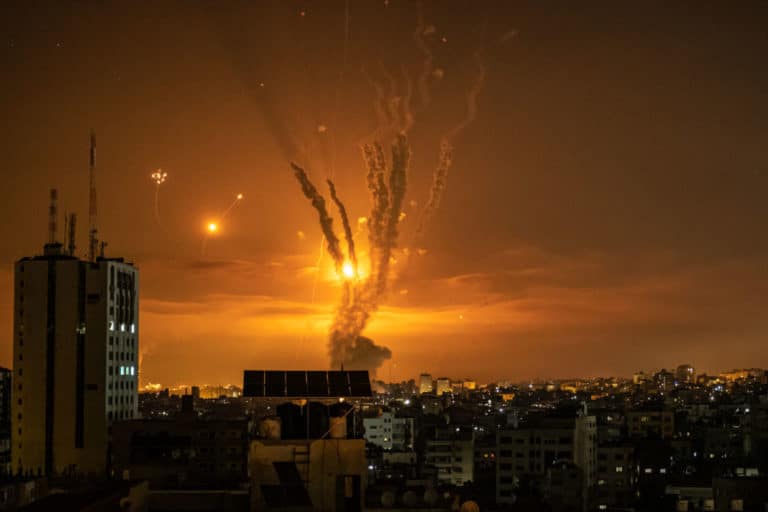
Editor’s note: This article was originally published in May of 2021.
It’s been a long week (even longer for those in Israel and the Gaza Strip) filled with headlines and social media posts on the current events in the Middle East.
We at Unpacked have been inundated with questions on the situation, and one in particular is being asked the most: “How can I talk about this conflict with my friends?”

This is a difficult question to answer. The rhetoric is charged, emotional and filled with half-truths (or straight up false information).
The fact of the matter is, no matter where you fall on the political spectrum, as Jews, we are being confronted about Israel whether we like it or not. Friends I haven’t spoken to since college have popped up in my social media channels asking me what I think about various aspects relating to the Israel/Palestinian conflict (also abbreviated as I/P).
A well-intended old friend of mine messaged me on Instagram this week: “When we both have time, I would love to get your take. I don’t post about Palestine stuff because I am not as well informed as I’d like to be before commenting, and out of respect and deference to my Jewish friends who might be offended if I posted/said something without reaching out directly before doing so.”
That’s a conversation I can have and that I did take, but not all of these talks are as civil or well intended. For example, walking home from Shul this Saturday a man on a bike shouted at me and a group of friends “Do Palestinian lives matter?” That conversation quickly disintegrated and was a missed opportunity for real talk.

Yes, for us in the Diaspora, these questions can be steeped in the trope of dual loyalty (“your home country is Israel, not here”). And yes, you should not feel obligated to answer for the political actions of a country where you don’t live.
But, we all know that this is a luxury we do not have as Jews because our very legitimate silence is always construed as the worst — by both sides. On the left, your “passivity” is viewed as enabling a colonial state committing ethnic genocide. On the right, your passivity makes your Zionism and Judaism suspect or not real.
The truth isn’t liberal or conservative, but the politicization of the fundamental facts surrounding this issue complicates things to the extreme.
Further complicating all of this is that the very existence of Israel as a legitimate state is disputed in many circles. This complicates the Israel-Palestinian conversation beyond any logic available for a real conversation. For many, the debate starts and stops at 1948 (the year Israel was formed). That is not a debate or a conversation steeped in reality, nor one I chose to engage in, because common ground is needed for a conversation to happen. The reality of the situation is Israel is a nation-state recognized by 164 countries.

But what about those other conversations? How can we respond to them in a rational way when we are being asked such loaded and leading questions with passions running very deep?
My best advice is to use facts and make it clear what your beliefs are (liberal/conservative Zionist or not).
For example: Fact, you can be a liberal Zionist despite people on both sides of the political spectrum saying that you can’t.
Also fact: You can be Jewish and not a Zionist.
Fact: You don’t have to be religious to be a Zionist (Bill Maher’s beliefs fall in line with this). Also fact: You can be religious and not a Zionist; for example, Satmar Hasidic Jews oppose Zionism on theological grounds.
This is why this conversation is so hard to have in an even-handed way. Most of the people asking us questions lack an understanding of the nuance of the political debate within Judaism and the Jewish people on this topic.
So, let me share with you some of the facts that I use when confronted about the I/P debate.
(Also I want to note, just because a question isn’t listed here, it doesn’t mean there isn’t a fact based answer. I hope to continue addressing these issues over the next couple of days.)
Isn’t this a religious war?
Yes and no (see how complicated this is?). Yes, in the way that Israel is a “Jewish” state, but no in the way that it is a secular, pluralistic country. What I mean is, Israel is a country for the Jewish people, but not everyone who is Jewish is religious (in the traditional sense), and not everyone in Israel is Jewish.
From an older Unpacked article:
At the end of the day, Israel is a Jewish state. It’s different than the U.S., which was founded on clear separation of church and state. Israel’s Declaration of Independence states: “This right is the natural right of the Jewish people to be masters of their own fate, like all other nations, in their own sovereign State. Accordingly we… are here assembled on the day of the termination of the British Mandate over Eretz-Israel and, by virtue of our natural and historic right and on the strength of the resolution of the United Nations General.”
A poll found that in 2020, 43% of Israeli Jews over the age of 20 self-identified as secular, and an additional 22% identified as traditional but not very religious. That’s a large percentage of “non-religious” Jews living in Israel.
On the other hand, Hamas, “is a Palestinian Sunni-Islamic fundamentalist but pragmatic, militant, and nationalist organization. It has a social service wing, Dawah, and a military wing, the Izz ad-Din al-Qassam Brigades” which controls the Gaza Strip. For the military wing of Hamas, this is a holy war, and it will only end with the destruction of Israel and the Jewish people.
Myth: This is a White colonial story/this is a one-sided struggle for people of color
Fact: Palestinians are Arabs, and yes, they do face discrimination and hardship in the occupied territories where they do not have Israeli citizenship.
Also fact: Israel is a diverse country made up of several ethnicities.
The ethnic makeup of Israel gets lost in the very real and needed debate over the plight of the Palestinians (the faces of the Israeli lives lost in this current crisis reflect that).
People often say to me, “Israel is 75% Jewish” and I say, go on… I then say, “Of that 75%, did you know that nearly 50% of them are Mizrahi or Sephardi?” In other words, your stereotypical Ashkenazi Jew only makes up half of Israel’s Jewish population. Tacked on to that are the 25% Arab population that are Israeli citizens. Israel isn’t a nation full of Larry Davids. In fact, it has a very diverse and large non-White population.
Myth: It’s an unfair/one-sided fight
I’ve been asked this question more and more these days. In this narrative, Israel is Goliath and the Gaza Strip is David. Nobody cheers for Goliath.
The truth is (and this is my one interjection of opinion): nobody should be cheering in this fight.
According to this argument, making the conflict more “fair” means addressing the disparity between Israel’s defensive weapons and Hamas’ offensive. In other words, removing the Iron Dome and letting rockets fall in civilian areas.
Fact: Israel does blockade the Gaza Strip, doing so it says for security reasons. Shipments of goods are heavily restricted because in the past, terrorists have used everything from building materials, to actually smuggled in weapons, to use against Israel.
Hamas, as the governing power in Gaza, choses to spend a large part of their budget on offensive weapons against Israel, like the rockets we see being used today. Israel does receive military funding from the United States (0.4% of the total Pentagon spending), which it spends on things like the Iron Dome, an air defense system against the rockets fired from Gaza.
Also fact: Hamas does fire rockets from civilian areas. Yes, there are civilian casualties from Israel’s air strikes, but the IDF tries to minimize this by notifying the occupants of buildings ahead of bombardments. This article from the news agency Reuters discusses how the IDF warns Gaza residents prior to air strikes.
As a journalist, I was taught to verify the authenticity of statements. This situation is complicated by the fact that Gaza’s Health Ministry is controlled by Hamas, and there are few independent fact checkers on the ground. Many times, dead Hamas fighters are included in the death toll, which overstates the actual count of civilian casualties. Also not differentiated is the cause of death, be it from an IDF air strike, a misfired rocket, or any other cause.
From Reuters:
The Israeli military said more than 2,000 rockets had been fired from Gaza into Israel since the start of the conflict, around half of which were intercepted by missile defence systems and 350 fell into the Gaza Strip.
At least 126 people have been killed in Gaza since Monday, including 31 children and 20 women, and 950 others wounded, Palestinian medical officials said.
Among the eight dead in Israel were a soldier patrolling the Gaza border and six Israeli civilians, including two children, Israeli authorities said.
All of these facts, however, do not mitigate the very real and deadly situation on the ground for Gaza’s civilian population.
Final thoughts
You may notice left out of this piece are answers. And that’s intentional, this piece is about how to talk about the conflict. Armed with facts it is on you to make your decisions on the conflict. And as for that, there’s no easy answer. At the end of the day, if we wish to solve this conflict without violence, this is a political process. Politics means debate and inclusion of thoughts and opinions. I pray that these opinions are based on facts.
Finally, Dr. Noam Weissman sent the following email to educators Sunday and I want to conclude with a few of his thoughts:
Use social media responsibly. Do not get into a fight on social media if you don’t know the person or if you don’t know the facts of the story. Do not regurgitate talking points. Instead, learn the history, background and story, and then jump in.
Underscore that the Israelis and Palestinians are real people, not sports teams to root for. As Einat Wilf writes in Maimonides Fund’s new journal Sapir, “Israelis and Palestinians are not sports teams. They are not stand-ins for good and evil, symbols for the struggles in one’s own group much closer to home… Israelis and Palestinians, Jews and Arabs are real people. They are struggling to resolve centuries-long conflicts, which they are slowly doing.”
Be more critical consumers of information. Also in Sapir, Matti Friedman writes about the need to distinguish between educators and activists. We need to ask ourselves, “Is your source of information an observer whose job it is to explain things, or an activist with a political plan?” The goal of activist organizations “isn’t meant primarily to explain what’s going on, but to induce you to support a particular position. Contradictory information won’t be included.”
Originally Published May 16, 2021 01:11PM EDT
